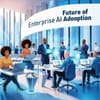Splunk's Vice President and Head of AI, Hao Yang, believes that AI adoption will happen much faster than the adoption of personal computers. According to Yang, enterprises are moving beyond static workflows and traditional systems into an intelligent ecosystem powered by AI agents and chatbots. These "agentic" systems are capable of autonomous work, potentially revolutionizing productivity for millions of knowledge workers.
Organizations need to assess their infrastructure's preparedness to handle AI-driven changes and ensure data security. Building trust in AI systems is crucial, and this can be achieved through observability, transparency, and human oversight. Yang emphasizes that hallucinations are a challenge that can't be completely eliminated but can be reduced through techniques like adjusting temperature settings and implementing validation steps.
Splunk is taking a human-in-the-loop approach, maintaining human oversight to verify AI-generated results and ensure accuracy. The company is also implementing design principles of traceability, providing clear explanations for AI decisions and actions, and guardrails to prevent AI from generating false or misleading information.
As AI adoption surges, more enterprises will embed AI into critical workflows. While many AI agent use cases are still experimental, Yang predicts that more will be ready for production use soon. With India being one of the top growth markets for Cisco, the company plans to leverage its large footprint to drive Splunk adoption.
The future of enterprise AI adoption looks promising, with AI agents and chatbots transforming the way businesses operate. By prioritizing transparency, accountability, and human oversight, organizations can unlock the full potential of AI and drive innovation.


